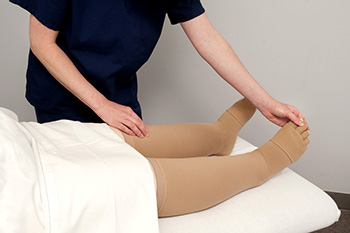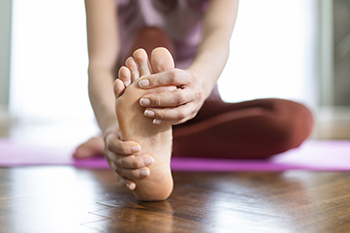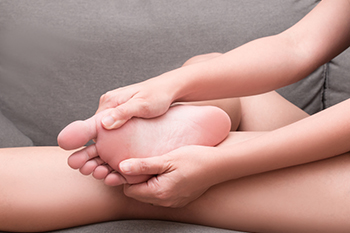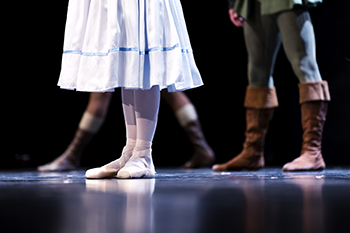Items filtered by date: November 2022
Mitigating Foot Pain During Pregnancy

During a woman’s pregnancy, she might experience several different important changes to her feet. For example, the increased weight gained from bearing a growing child can put extra strain on the feet, sometimes causing foot pain. There are several steps that a pregnant woman could consider taking to mitigate her increased foot pain. First, a pregnant woman might drink a good deal of water. Doing this will help reduce the amount of salt in the body, consequently minimizing inflammation in the feet. Also, a pregnant woman could apply ice to the feet if the ankles become exceedingly swollen. Applying ice in short increments to the feet can help bring down the swelling. Lastly, a pregnant woman can make an appointment with a podiatrist to help treat any pain in the feet that she is experiencing. To learn more about mitigating foot pain during pregnancy, make an appointment with a podiatrist today.
Pregnant women with swollen feet can be treated with a variety of different methods that are readily available. For more information about other cures for swollen feet during pregnancy, consult with one of our podiatrists from Quad Cities Foot and Ankle Associates. Our doctors will attend to all of your foot and ankle needs.
What Foot Problems Can Arise During Pregnancy?
One problem that can occur is overpronation, which occurs when the arch of the foot flattens and tends to roll inward. This can cause pain and discomfort in your heels while you’re walking or even just standing up, trying to support your baby.
Another problem is edema, or swelling in the extremities. This often affects the feet during pregnancy but tends to occur in the later stages.
How Can I Keep My Feet Healthy During Pregnancy?
- Wearing orthotics can provide extra support for the feet and help distribute weight evenly
- Minimize the amount of time spent walking barefoot
- Wear shoes with good arch support
- Wear shoes that allow for good circulation to the feet
- Elevate feet if you experience swelling
- Massage your feet
- Get regular, light exercise, such as walking, to promote blood circulation to the feet
If you have any questions please feel free to contact our offices located in Bettendorf, DeWitt, and Davenport, IA. . We offer the newest diagnostic and treatment technologies for all your foot and ankle needs.
Edema of the Lower Extremities

Edema or swelling in the ankles and feet can be an inconvenience or cause severe discomfort and pain. Ways to alleviate edema include continuing to move the affected body parts and elevate the legs above the heart, massaging the swollen areas to push the retained fluid out, and wearing compression socks to facilitate blood flow. The goal of these things is to pump excess fluid back to the heart. Reducing salt intake and dropping extra weight if one is overweight can also help or prevent edema. If the things you try on your own do not relieve the swelling or if the swelling gets worse, it is important that you consult with a podiatrist to find out what is causing the problem and how it can be fixed.
Swollen feet can be a sign of an underlying condition. If you have any concerns, contact one of our podiatrists of Quad Cities Foot and Ankle Associates. Our doctors can provide the care you need to keep you pain-free and on your feet.
Swollen feet are a common ailment among pregnant women and people who stand or sit for extended periods. Aging may increase the possibility of swollen feet and patients who are obese often notice when their feet are swelling too. There may be medical reasons why swollen feet occur:
- Phlebitis - A condition that causes the veins to become inflamed and can also cause leg pain.
- Liver disease - This may lead to low blood levels of albumin which is a protein. This can cause fluid in the blood to pass into the tissues and several areas of the body can become swollen.
- Heart failure - When the heart doesn’t pump properly the blood that is normally pumped back to the heart can pool in the veins of the legs causing swollen feet.
- Kidney disease - One of the main functions of the kidneys is releasing excess fluid in the body. This type of condition can make it difficult for the kidneys to function properly, and as a result the feet may become swollen.
- Deep-vein thrombosis (DVT)- This is a serious condition where blood clots form in the veins of the legs. They can block the return of blood from the legs to the heart which may cause the feet to swell. It is important to be treated by a podiatrist if this condition is present.
Swollen feet can also be caused by bone and tendon conditions, including fractures, arthritis, and tendinitis. Additionally, there may be skin and toenail conditions and an infection may cause the feet to swell. Patients who take medicine to treat high blood pressure may be prone to getting swollen feet.
Many patients elevate their feet to help relieve the swelling and this is generally a temporary remedy. When a podiatrist is consulted the reason behind the swelling can be uncovered and subsequently treated.
If you have any questions please feel free to contact our offices located in Bettendorf, DeWitt, and Davenport, IA. . We offer the newest diagnostic tools and technology to treat your foot and ankle needs.
Common Causes of Toe Pain

Toe pain can arise from a variety of causes, but the most common include ingrown toenails, bunions, and blisters. Various types of arthritis and diabetes can also lead to toe pain. If you feel your toe is painful to the touch, shoes should be checked for a proper fit. They may be too tight, not supportive enough, or have heels that are too high. Resting and elevating the foot may also help relieve temporary toe pain. When there is redness, warmth, or swelling, there could be an infection requiring immediate medical attention. If you are having pain in your toes and it is not subsiding or is worsening, consult with a podiatrist who can diagnose the problem and provide the appropriate treatment for you.
Toe pain can disrupt your daily activities. If you have any concerns, contact one of our podiatrists of Quad Cities Foot and Ankle Associates. Our doctors can provide the care you need to keep you pain-free and on your feet.
What Causes Toe Pain?
Most severe toe pain is caused due to a sports injury, trauma from dropping something heavy on the toe, or bumping into something rigid. Other problems can develop over time for various reasons.
Toe pain can be caused by one or more ailments. The most common include:
- Trauma
- Sports injury
- Wearing shoes that are too tight
- Arthritis
- Gout
- Corns and calluses
- Hammertoe
- Bunions
- Blisters
- Ingrown toenails
- Sprains
- Fractures (broken bones)
- Dislocations
When to See a Podiatrist
- Severe pain
- Persistent pain that lasts more than a week
- Signs of infection
- Continued swelling
- Pain that prevents walking
Diagnosis
In many cases the cause of toe pain is obvious, but in others, a podiatrist may want to use more advanced methods to determine the problem. These can range from simple visual inspections and sensation tests to X-rays and MRI scans. Prior medical history, family medical history, and any recent physical traumatic events will all be taken into consideration for a proper diagnosis.
Treatment
Treatments for toe pain and injuries vary and may include shoe inserts, padding, taping, medicines, injections, and in some cases, surgery. If you believe that you have broken a toe, please see a podiatrist as soon as possible.
If you have any questions please feel free to contact our offices located in Bettendorf, DeWitt, and Davenport, IA. . We offer the newest diagnostic tools and technology to treat your foot and ankle needs.
How Do Sesamoid Bones Become Inflamed?
 There are two bones that lie in the tendons beneath the joint in the big toe. These are known as the sesamoid bones, and their function is to help the foot to push off while walking. People who frequently run may experience a condition that is called sesamoiditis. This can happen when the sesamoid bones become inflamed from excessive pressure and the impact the bones endure while running. Symptoms that many people have with this condition can be a sudden sharp pain, which may indicate a fracture has happened. More commonly, a burning pain may occur, which may be a sign of nerve damage. Additionally, the ball of the foot can be tender while walking on it, and it may feel like there is a pebble in the shoe. Poor foot mechanics may lead to developing sesamoiditis, and the tendon that houses the sesamoid bones may be tight. This condition can negatively impact completing daily activities, and it is advised that you consult with a podiatrist if you have any of the above symptoms.
There are two bones that lie in the tendons beneath the joint in the big toe. These are known as the sesamoid bones, and their function is to help the foot to push off while walking. People who frequently run may experience a condition that is called sesamoiditis. This can happen when the sesamoid bones become inflamed from excessive pressure and the impact the bones endure while running. Symptoms that many people have with this condition can be a sudden sharp pain, which may indicate a fracture has happened. More commonly, a burning pain may occur, which may be a sign of nerve damage. Additionally, the ball of the foot can be tender while walking on it, and it may feel like there is a pebble in the shoe. Poor foot mechanics may lead to developing sesamoiditis, and the tendon that houses the sesamoid bones may be tight. This condition can negatively impact completing daily activities, and it is advised that you consult with a podiatrist if you have any of the above symptoms.
Sesamoiditis is an unpleasant foot condition characterized by pain in the balls of the feet. If you think you’re struggling with sesamoiditis, contact one of our podiatrists of Quad Cities Foot and Ankle Associates. Our doctors will treat your condition thoroughly and effectively.
Sesamoiditis
Sesamoiditis is a condition of the foot that affects the ball of the foot. It is more common in younger people than it is in older people. It can also occur with people who have begun a new exercise program, since their bodies are adjusting to the new physical regimen. Pain may also be caused by the inflammation of tendons surrounding the bones. It is important to seek treatment in its early stages because if you ignore the pain, this condition can lead to more serious problems such as severe irritation and bone fractures.
Causes of Sesamoiditis
- Sudden increase in activity
- Increase in physically strenuous movement without a proper warm up or build up
- Foot structure: those who have smaller, bonier feet or those with a high arch may be more susceptible
Treatment for sesamoiditis is non-invasive and simple. Doctors may recommend a strict rest period where the patient forgoes most physical activity. This will help give the patient time to heal their feet through limited activity. For serious cases, it is best to speak with your doctor to determine a treatment option that will help your specific needs.
If you have any questions please feel free to contact our offices located in Bettendorf, DeWitt, and Davenport, IA. . We offer the newest diagnostic and treatment technologies for all your foot and ankle needs.
Foot Care for Dancers

Human feet are complex. Of the 208 bones in the body, 52 of them are in the feet. Feet also provide major service to the body with support, balance, and propulsion. It is necessary for dancers to properly take care of their feet because they depend on the complexity of their feet to dance. They must do what they can to prevent and treat minor injuries and take good care of their feet as a way of life to keep moving. Things they can do include cutting their toenails short and straight across, not wearing colored nail polish so they can see problems brewing under their toenails, keeping calluses trimmed, wearing tights with ballet shoes to help prevent corns from developing, and taking care of foot problems as they arise. If you are a dancer, or if your child is starting to dance, and you would like to learn more about taking care of a dancer’s feet, consult with a podiatrist.
Sports related foot and ankle injuries require proper treatment before players can go back to their regular routines. For more information, contact one of our podiatrists of Quad Cities Foot and Ankle Associates. Our doctors can provide the care you need to keep you pain-free and on your feet.
Sports Related Foot and Ankle Injuries
Foot and ankle injuries are a common occurrence when it comes to athletes of any sport. While many athletes dismiss the initial aches and pains, the truth is that ignoring potential foot and ankle injuries can lead to serious problems. As athletes continue to place pressure and strain the area further, a mild injury can turn into something as serious as a rupture and may lead to a permanent disability. There are many factors that contribute to sports related foot and ankle injuries, which include failure to warm up properly, not providing support or wearing bad footwear. Common injuries and conditions athletes face, including:
- Plantar Fasciitis
- Plantar Fasciosis
- Achilles Tendinitis
- Achilles Tendon Rupture
- Ankle Sprains
Sports related injuries are commonly treated using the RICE method. This includes rest, applying ice to the injured area, compression and elevating the ankle. More serious sprains and injuries may require surgery, which could include arthroscopic and reconstructive surgery. Rehabilitation and therapy may also be required in order to get any recovering athlete to become fully functional again. Any unusual aches and pains an athlete sustains must be evaluated by a licensed, reputable medical professional.
If you have any questions please feel free to contact our offices located in Bettendorf, DeWitt, and Davenport, IA. . We offer the newest diagnostic and treatment technologies for all your foot and ankle needs.
